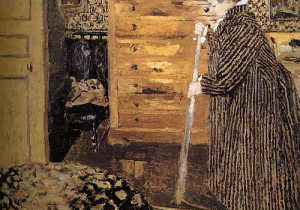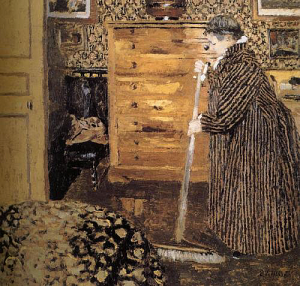Sermon for the Lord’s Advent: A Guest Post from the 12th Century
Today’s blog post is a sermon written in the middle of the twelfth century by Richard of St. Victor.[1] I have had the pleasure of reading Richard’s writings almost every day for the past six months, and I want to share some of his words with you.
Be ready, Israel, to meet the Lord, for he comes. Beloved Brethren[2], just as everything is holy, so a place, in as much as it is a place, is holy; and so too a time is holy, in as much as it is a time. Nevertheless we say in relation to different places, ‘this place is good or bad’ and of different times, ‘this place is good or evil’. But it is not on account of the place or time that we say either of these things, but because of the circumstances of place or time. Therefore as one place is described as less sacred because of some sin committed there and another more holy because of the operation of grace in that place, so also one period of time maybe called less holy because some wickedness took place then, and another more holy because of the practice of religion in that period. Nevertheless in as far as time is time, all time is holy and every place, as such, is holy. Now Brethren, it is almost the time of our Lord’s Advent during which we must prepare ourselves for a spiritual feast. This is the time when God comes as a Man to man to redeem man, to free and justify and beatify them; redeeming them from guilt, freeing them from punishment, justifying them by grace, beatifying them by glory. In such a holy time as this, we ought to exercise ourselves more strenuously in virtue, so that we may deserve to be more abundantly visited by His grace. Certainly if the king were to condescend to visit us and to make his dwelling place with us, we ought diligently to prepare ourselves and all that is ours to receive him.
Therefore, Brethren, let us, who perhaps are occupied in working out of doors in servile works, take pains to enter into the house of our heart, to open its windows, to examine what is seemly or unseemly in it, to bring the spiders’ webs down, to clean out the yard with brooms and throw out the dirt and dust, and when it is cleaned, to cover the floor with fresh-gathered rushes, scented herbs and sweet-smelling flowers. Let us adorn the walls with coloured curtains, put on our holiday garments, prepare a solemn banquet, and then joyfully go to meet Him with happy songs. If we were busy outside our real selves with servile works, that is, intent upon sin, let us come back to our own hearts, as the Prophet teaches us saying: ‘Return ye transgressors to the heart.’ The windows of this house are the spiritual senses, but which divine knowledge shines in upon us and illuminates the recesses of our mind. Let us open these windows and look around carefully so as to see what is good or evil in the place; let us keep the good things and throw out the bad. Those thin spiders’ webs which hang high up signify the boastfulness of the human mind. One man is exalted because of his noble descent, another because of the flower of his beauty, another because of the vigour of his strength, another on account of his piled-up possessions, yet another for the display of his power, another because of the greater prerogatives of heavenly grace which he has harvested. But whoever indulges in pride is weaving foolish spider’s webs to hang up on high. Let us pull sown those webs, Brethren, by subduing boastfulness, as the Apostle teaches us saying: ‘Be not highminded, but fear.’ Let us clean the yard of our hearts and throw out the dust and filth. Filth defiles and dust flies about. So filth signifies uncleanness and dust means vainglory. Let us throw out both of these by contrition of heart and confession of our lips.
And afterwards let us strew the pavement of our hearts with rushes by the satisfaction of penance, that nothing that has been done in our earthly and fleshly life may be seen in us, as David said: ‘Blessed are they whose iniquities are forgiven and whose sins are covered.’ Let us have the scented herbs and sweet-smelling flowers of good opinion, that we may say with the Apostle: ‘For we are unto God a sweet savour of Christ, in every place.’ The many-coloured curtains are the different virtues. We must stretch them out by the exercise of the virtues. Some curtains are green, others blue or yellow, some black, red or white. Green signifies faith, for as the greenness of things which the earth is just bringing forth, strikes the senses first, so faith is the first of all the virtues. First I say, in order not in honour, for charity precedes all the other virtues in honour and without it the rest are nothing worth. Blue dignifies divine hope, for it shows in itself the colour of the sky and the upper airs. By the yellow coloured curtains, charity is typified, because the colour yellow is like flame. The black curtain shows humility which is always reminding itself of the blackness of its sins. Red is suffering, for it is never ashamed of the Blood of the Passion. White means purity, for it shines out always and is unstained. Your festival garments, Brethren, represent good works. For as fine garments adorn men outwardly in the sight of men, so good works speak for and commend a good and just man. Indeed there is nothing that we count more glorious than these garments, nothing more precious, praiseworthy or useful. Let us have a care to put them on if we would be fine when the Lord comes!
We must prepare the food by more frequent and customary reading and meditation of the Holy Scriptures. The soul is invigorated by this food and fattened by it; it receives strength for good works and perseveres in them to perfection without falling back. And as we must show gladness of heart at His coming by our songs, as it is written: ‘O bless our God, ye people, and make the voice of his praise to be heard.’
So then, let us take trouble to open our windows by examining the mind, to pull down the spiders’ webs by suppressing boastfulness, to sweep the yard by confession of sins, to strew the rushes with satisfaction of penance, to hang up and stretch the curtains by the exercise of virtues, to put on precious garments by showing good works, to prepare the food by reading and meditation of Holy Scriptures, to rejoice in singing our songs of divine praise! In this way let us be prepared for the coming of our Lord, that we may be worthy to be visited by Him who liveth and reigneth God, world without end. Amen.
[1] Richard of St. Victor, “Sermon V. for the Lord’s Advent,” in Selected Writings on Contemplation, trans. Clare Kirschberger (London: Faber and Faber, 1957), 249-252.; Painting by Edouard Vuillard
[2] Richard of St. Victor was a cloistered canon in the School of St. Victor. His audience was other canons, all men. I have chosen to leave the gender-specific language of this translation (both for historical reasons and because this is someone else’s translation), but I believe his words are true for all of us, men and women, clerics and laypeople.
Robyn
Latest posts by Robyn (see all)
- I’m A Man But I Can Change? Human Nature and Human Enhancement - December 12, 2016
- The Nicene Creed: “…to judge the quick and the dead…” - July 4, 2016
- Can Hermeneutics be Ethical? Ricoeur and the War - June 7, 2016


